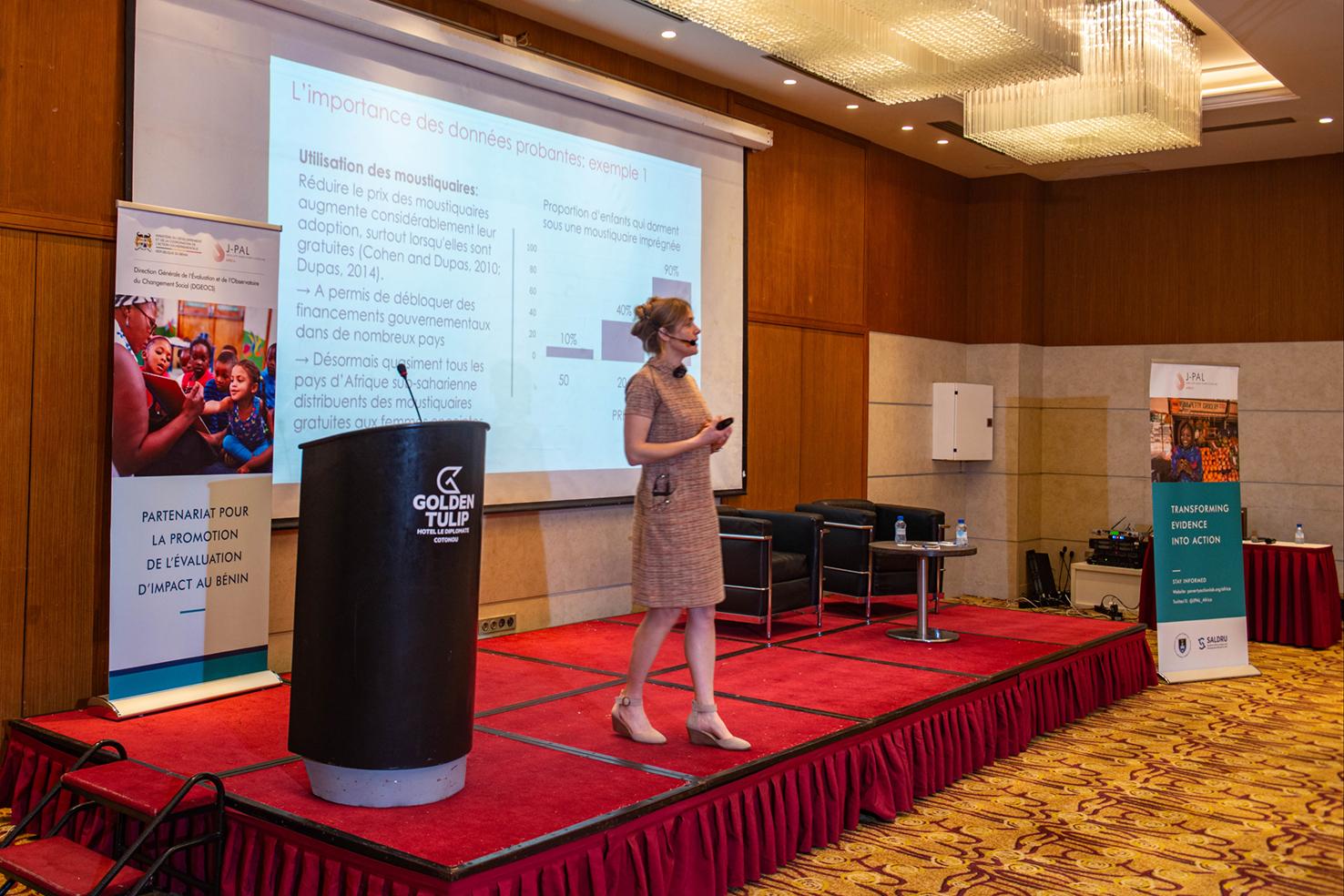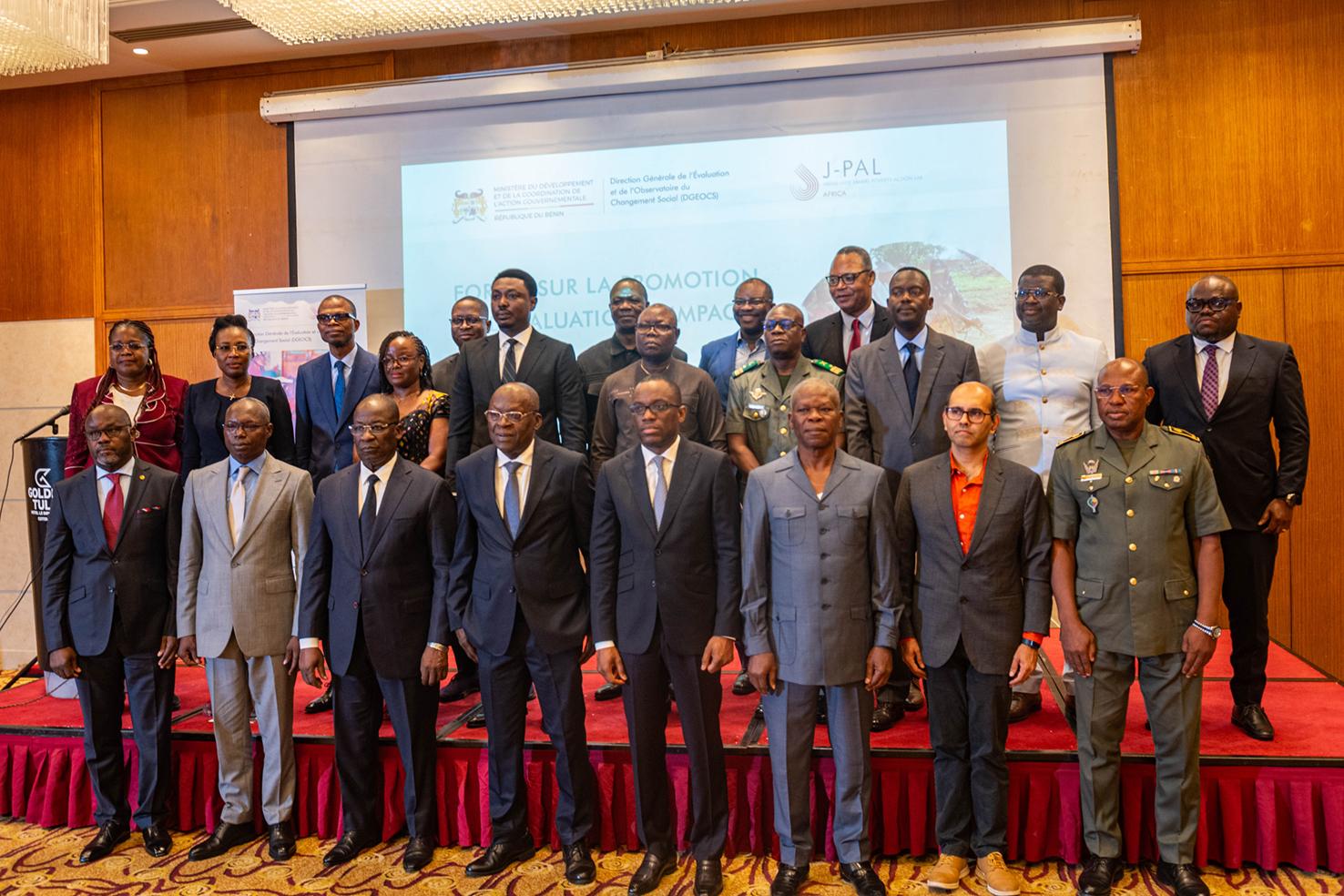
Launch of national partnership in Benin to support evidence-informed policymaking

J-PAL Africa has launched a multi-year partnership with Benin’s Ministry of Development and Coordination of Government Action (MDC) to co-identify, generate, and integrate evidence into policy across the government. This collaboration builds on the momentum generated by Benin’s 2024 law that promotes the use of data in public decision-making.
The Benin Evidence Forum—held on March 10 in Cotonou to mark the launch—brought together government officials and J-PAL Africa leadership to reflect on how data and impact evaluations can support policy priorities in Benin.
Forum week: A collaborative push for evidence-based policy
The launch was presided by Minister of State Abdoulaye Bio Tchané, alongside four other government ministers and the Directors of Cabinet from all 22 ministries. J-PAL affiliated professors Pascaline Dupas (Princeton; Co-Scientific Director, J-PAL Africa) and Jenny Aker (Tufts; Co-Chair, Digital Identification and Finance Initiative) along with Cillian Nolan (Executive Director, J-PAL Europe), and Vinayak Bhardwaj (Executive Director, J-PAL Africa) also spoke at the event.
Opening the forum, Minister Bio Tchané reaffirmed the government’s commitment to integrating rigorous research into policymaking. He highlighted the partnership as a meaningful step in Benin’s broader efforts to strengthen evidence-based governance.
"Together we have the opportunity to open a new chapter in the public governance of our country," he stated. "This partnership marks a crucial step in the institutionalization of evaluation in Benin."
The Minister also shared hopes to establish a national impact evaluation laboratory—a center intended to support the production of rigorous evidence to inform public decision-making and contribute to national development priorities.

Building on the Minister’s call for stronger use of evidence in governance, Pascaline Dupas delivered a keynote address emphasizing the value of rigorous research in shaping effective policies. “Evidence isn’t just academic—it’s the foundation for effective governance,” she said.
With international aid declining significantly across major donor countries, Dupas discussed the importance of evidence-based approaches to improve the effectiveness and efficiency of public policies, particularly in contexts where funding is under pressure. She shared examples from research led by J-PAL affiliated professors—including studies that have helped inform national policies on mosquito net distribution and foundational learning—to illustrate the importance of data in improving cost-effectiveness when national budgets are limited.

The afternoon panel discussed the role of impact evaluations in strengthening policy effectiveness and long-term sustainability.
Director of Cabinet Alastaire Sèna Alinsato emphasised how the government’s key challenge is ensuring that its programs have lasting effects, and how important it is to start using impact evaluations more systematically to understand what works, what doesn’t, and why. He noted that Benin is increasingly drawing on international evidence to refine its own education policies, particularly in the technical and vocational sectors.
Echoing this theme, Permanent Secretary of the National Committee for Economic Policy, Hermann Orou Takou, highlighted that the country’s new legal framework on evaluation not only supports the institutionalization of using evidence but also enables greater autonomy by facilitating public financing for evaluation activities. He noted that evidence can play a role in promoting accountability, continuity between administrations, and more effective strategic planning.
Jenny Aker spoke about research underway in the agriculture sector and noted the importance of designing projects with long-term sustainability in mind—particularly ensuring that communities can continue to benefit from interventions beyond shifts in political will or donor cycles.
Cillian Nolan emphasized the value of long-term partnerships grounded in local priorities. He noted that research alone is not enough—lasting impact also relies on strong institutions and sustained collaboration between researchers and policymakers.
The day’s discussions pointed to the value of integrating rigorous evidence into policymaking—particularly in helping to shape current and future national policy decisions. In this spirit, J-PAL and Benin’s partnership will focus on four key objectives:
- Understanding Benin’s policy priorities and systematically sharing evidence on these when available
- Generating new evidence to help address critical questions
- Adapting, integrating, and scaling solutions shown to be effective, and
- Strengthening local capacity to generate and interpret evidence.
Looking ahead
Through strong partnerships with the MDC, J-PAL Africa and researchers in the J-PAL network will support the institutionalization of evidence-based decision-making across the government of Benin.

The forum was co-organized with the Direction Générale de l'Évaluation et de l'Observatoire du Changement Social, with the leadership of Abdoulaye Gounou, Lechidia de Souza, and Gbètoton Djossou. Together, they are spearheading efforts to strengthen institutional capacity for policy evaluation across ministries.



